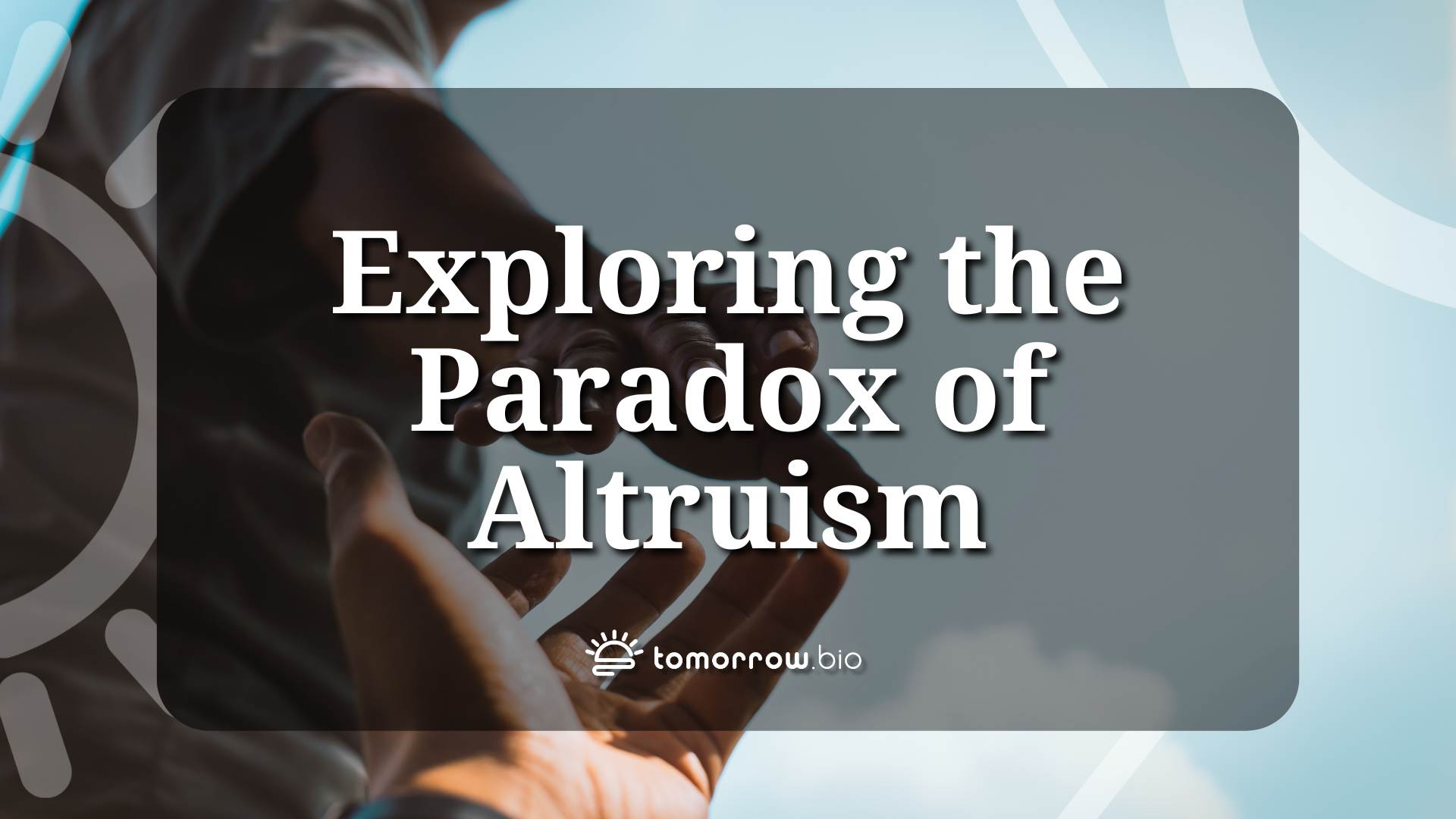


Explore the fascinating paradox of altruism in this thought-provoking article.

In a world often filled with self-interest and individualistic pursuits, one concept stands out as both noble and puzzling: altruism. On the surface, altruism seems straightforward, the voluntary act of helping others without expectation of personal gain. However, delving deeper reveals a fascinating paradox that challenges our understanding of human nature and raises thought-provoking questions. This article will take you on a journey to explore the many facets of the paradox of altruism, from its philosophical roots to its implications in modern society.
Before we embark on this exploration, let's first ensure we comprehend the essence of altruism. At its core, altruism can be described as a selfless act driven by genuine concern for the well-being of others. It goes beyond mere kindness, encompassing actions that prioritize the welfare of others above one's own.
But what motivates individuals to engage in such selfless acts? Is it an innate sense of compassion or a learned behavior? Researchers have delved into the psychological and sociological aspects of altruism to shed light on these questions. Studies have shown that altruistic behavior can be influenced by factors such as empathy, moral values, social norms, and even genetic predispositions.
To truly grasp the profound nature of altruism, we must turn to its philosophical origins. Throughout history, great thinkers have contemplated the moral dimensions of selflessness. From the teachings of ancient Greek philosophers like Plato and Aristotle, who emphasized the importance of virtue and the common good, to the ethical frameworks of renowned modern thinkers like Immanuel Kant and John Stuart Mill, the concept of altruism has been dissected, analyzed, and debated.
For example, Kant argued that altruistic actions should be guided by a sense of duty and moral obligation, rather than personal gain or utility. On the other hand, Mill advocated for a utilitarian approach, where actions are judged based on their ability to maximize overall happiness and minimize suffering.
These philosophical perspectives provide us with a deeper understanding of the ethical implications of altruism and its role in shaping our moral landscape.

While the philosophical roots of altruism provide a solid foundation, we cannot overlook its manifestation in today's world. Altruism can be witnessed in various domains, from individuals volunteering their time and skills to organizations providing aid to those in need.
One notable example of altruism in modern society is the rise of social enterprises. These businesses prioritize social and environmental impact alongside financial profitability. By integrating altruistic values into their core operations, these enterprises aim to address pressing societal issues while generating sustainable solutions.
Moreover, the digital age has brought about new avenues for altruistic acts. Online crowdfunding platforms have enabled individuals to support causes they believe in, allowing them to contribute to positive change on a global scale. From funding medical treatments for those in need to supporting innovative social projects, these platforms have democratized philanthropy and empowered individuals to make a difference.
By examining the prevalence of altruistic acts in contemporary society, we gain insights into the relevance and impact of selflessness amidst the complexities of modern life. It prompts us to reflect on our own capacity for altruism and consider how we can contribute to creating a more compassionate and equitable world.
Now that we have laid the groundwork, let's delve into the enigma that is the altruism paradox. What exactly is this paradox, you may ask? Well, it is the perplexing notion that altruistic acts, which seemingly defy self-interest, can, at times, offer benefits to the giver. Let's unpack this paradox by examining its definition and exploring diverse theoretical perspectives.
But before we dive deeper into the subject, it is important to understand that altruism, in its simplest form, refers to selfless acts performed for the benefit of others. It is the act of putting the needs and well-being of others before our own. However, the altruism paradox challenges the assumption that acts of selflessness are inherently devoid of personal gain. It suggests that even when we engage in acts of altruism, we may experience psychological, emotional, or social rewards that contribute to our well-being. The paradox lies in the fact that selflessness can be, to some extent, selfish.
So, why do we engage in acts of altruism if there is a potential for personal gain? This question has fascinated researchers from various fields, leading to the development of numerous theoretical frameworks to better understand the complexities of the altruism paradox.

One theoretical perspective that sheds light on the altruism paradox is evolutionary theory. According to this perspective, altruism may have evolved as a result of the benefits it provides to individuals and groups. From an evolutionary standpoint, acts of altruism can enhance the survival and reproductive success of individuals who engage in them. For example, in social species like humans, acts of cooperation and helping others can strengthen social bonds and increase the chances of survival for the group as a whole.
Furthermore, genetic influences also come into play when considering the altruism paradox. Research has shown that certain genes can influence our tendencies towards selfless behavior. These genes may be selected for over generations, as individuals who possess them are more likely to engage in acts of altruism, ultimately benefiting their own genetic lineage.
By examining these perspectives, we gain valuable insights into the intricate interplay between self-interest and altruism. It becomes clear that the altruism paradox is not a simple black-and-white concept, but rather a complex phenomenon influenced by various factors.
So, the next time you perform an act of altruism, remember that it may not be as selfless as it seems. While you may be helping others, you may also be benefiting yourself in ways that are not immediately apparent. The altruism paradox serves as a reminder that our motivations and actions are often driven by a combination of self-interest and genuine concern for others.
As we unravel the paradox of altruism, it becomes evident that its roots extend beyond philosophical and theoretical realms. Our very biology contributes to our propensity for selflessness, shedding light on the evolutionary significance and genetic influences of altruistic behavior.
Evolutionary theory posits that altruism can be advantageous from a survival standpoint. In certain contexts, helping others can increase the chances of one's own genes being passed on, thereby promoting the continuation of one's genetic lineage. This perspective challenges the notion that altruism exists solely as a result of selfless motivations, hinting at the complex interplay between biology and self-interest.
Genetics also play a role in shaping our capacity for altruism. Numerous studies have explored the genetic underpinnings that contribute to our inclination towards selflessness. Whether it be variations in specific genes or the intricate interplay of genetic and environmental factors, our DNA holds valuable clues to the origins of altruistic tendencies.

Altruism, it seems, is not solely a philosophical or biological puzzle but is deeply intertwined with the workings of our minds. Psychological research sheds light on the complex mechanisms behind altruistic behavior and its impact on both individuals and society as a whole.
Social psychology explores how altruism can be influenced by various situational and social factors. From the bystander effect to the power of empathy, researchers investigate the intricate web of psychological processes that drive selflessness or, at times, hinder it. Understanding these dynamics provides us with valuable insights into fostering a more empathetic and compassionate society.
Altruism not only benefits those on the receiving end but also has profound effects on the mental well-being of the giver. Research suggests that engaging in acts of selflessness can lead to enhanced happiness, reduced stress levels, and improved overall mental health. As we explore the impact of altruism on our well-being, we uncover yet another piece of the paradoxical puzzle.
Although altruism often carries a positive connotation, ethical questions and controversies arise when we study this concept in depth. Examining the moral dimensions of selflessness allows us to critically evaluate the implications, limitations, and potential shortcomings of altruistic behavior.
Moral philosophers have long grappled with the ethical underpinnings of altruism. Does selflessness require absolute sacrifice? What are the ethical boundaries when balancing one's own needs and the needs of others? Engaging with these questions allows us to navigate the complex terrain where altruism and morality intersect.
Just as there are those who champion altruism, critics and skeptics also voice their concerns. Some argue that acts of apparent selflessness may ultimately serve hidden ulterior motives. Others question the sustainability of altruistic efforts in a world driven by self-interest. By exploring these criticisms, we gain a more nuanced understanding of altruism's limitations and challenges.
Exploring the paradox of altruism reveals a complex tapestry of philosophical, biological, psychological, and ethical dimensions. From its ancient roots to its modern manifestations, altruism captivates us with its profound implications and puzzling contradictions. As we navigate this paradox, let us reflect on the power of selflessness, challenge our assumptions, and continue to explore the intricate nature of human compassion.